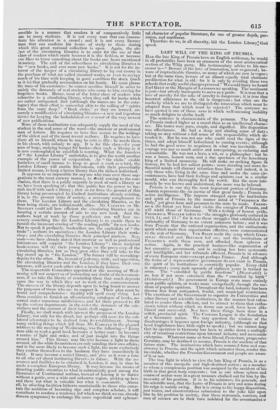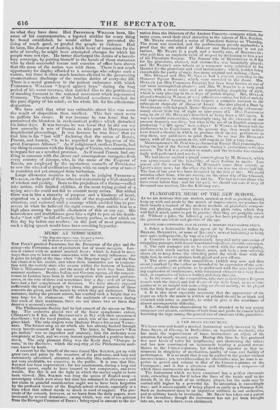IrAST WILL OF THE KING OF PRUSSIA.
HAD the late King of Prussia been an English nobleman, he would in all probability have been an ornament of the most aristocratical section of the Whig party. His testamentary advice to his suc- cessor is—" Beware of the love of innovation, now so general; be- ware of impracticable theories, so many of which are now in vogue; but at the same time, beware of an almost equally fatal obstinate predilection for what is old : for it is only by avoiding these two schools that really useful changes proceed." We could fancy we heard Earl GREY or the Marquis of LANSDOWNE speaking. The sentiment is just—but utterly inadequate to serve as a guide. It is true that a love of novelty for the sake of novelty is dangerous; it is true that besotted adherence to the old is dangerous ; but what arc the marks by which we are to distinguish the innovation which must be adopted from that which must be rejected ? The sentence we have quoted is one of those saws in which well-meaning inability so much delights to clothe itself.
The sentence is characteristic of the penman. The late King of Prussia ranked higher as a moral than as an intellectual charac- ter. Ilis tastes were pure, simple, and dignified. His disposition was affectionate. He had a deep and abiding sense of duty ; taking no step without a full sense of the responsibility which at- tended it. But he was not one who could read the signs of the times, and adapt himself beforehand to coming events ; although he had the good sense to acquiesce in what was inevitable. His courage was not so much active and enterprising, as enduring and indomitable. He was not a hero, a wit, or a philosopher : but he was a brave, honest man, and a fine specimen of the hereditary king of a limited monarchy. He will make no striking figure in history, for he had few salient points : more dazzling and more in- fluential minds will distract attention from him : and indeed, it is only those who, living in the same time and under the same cir- cumstances, have had their feelings and opinions cast in a similar mould, who can thoroughly feel his worth. But the more inti•• mutely he was known and understood, the more was he beloved.
Prussia is in our day the most important portion of Germany. Austria represents the vis inertice of that great family ; Prussia its active intelligence. The impress stamped upon the institutions and spirit of Prussia by the master mind of "FREDERICK the Only," yet gives form and pressure to the state he made. FREDE- RICK the Great yet lives and wields the energies of Prussia, and will wield those of Germany. With a feeling of honest pride, FREDERICK WILLIAM refers to "the struggles gloriously endured in 1813, 14, and 15;" for it was these struggles that established the nationality of Germany to an extent unknown before ; and it was from Prussia that the national organization, and the enthusiastic spirit which made that organization effective, were communicated to the rest of Germany. VON STEIN made the army which GNEI.. SENAE directed and Ileuenca led on; and the institutions of FREDERICK made these men, and afforded them spheres of action. Again, in the practical business-like organization of her executive government, and in making her laws systematic and intelligible, and her tribunals efficient, Prussia is in advance of every European state—except perhaps France. And although the forms of a representative government do not exist in Prussia, the spirit of its institutions is essentially popular. Every child is educated ; every male upwards of eighteen years is trained to arms. The " ennobled by public functions " (Dienst-adel) is no less if' not inure esteemed than the " ennobled by birth" (Gebiirts-adel.) No government in Europe rests more entirely upon public opinion, or works more energetically through the me- dium of popular opinions. Throughout the land, industry has been thrown free fr•orn antiquated, feudal, and municipal restrictions. The exertions of the Government to organize its Universities and other literary and scientific institutions, in the manner best calcu- lated to render them efficient, and to attract to them that enthu- siastic talent without which no 1brms can avail, have been alike liberal and successful. Nor have these things been done in a selfish, provincial spirit. The Customs League is the foundation of a Germanic nation. We may question the wisdom of the disadvantages it imposes upon foreign industry, (although on that head Englishmen have little right to speak) ; but we cannot deny that its operation in Germany has been to strike down a multipli- city of vexatious restrictions upon internal industry and mercantile enterprise. Whatever name or forum liberal, Protestant, progressive Germany, may be destined to assume, Prussia is the nucleus of that future state. The institutions which have assumed form and con- sistency in Prussia, and the spirit which animates them, render this inevitable, whether the Prussian Government and people are aware of it or not.
The true light in which to view the late King of Prussia, is as a member of this energetic and high-destined nation ; as a member to whom a conspicuous position was assigned by the accident of his birth in that great body corporate ; but as one whose sphere and course of action were in a great measure chalked out for him by the necessity of his position. It is to his ministers, his generals, and his scientific men, that the lustre of Prussia in arts and arms during his reign is mainly owing. But it is owing to his happy disposition, just tastes, and unostentatious submission to the yoke laid upon him by his position in society, that these statesmen, warriors, and men of science are in their turn indebted for the ormortunityt 0
do what they have done. Had FREDERICK W11.1,141)1 been, like some of his contemporaries, a bigoted stickler for every thing be found established, he would either have prevented the doing of much good, or goaded the people to violence. Had he been, like JOSEPH of Austria, a fickle lover of innovation for the sake of novelty, he might have attempted changes for which his people were not ripe. He better discharged the duties of a heredi- tary sovereign, by putting himself in the hands of those statesmen who by their successful tenure and exercise of office have shown that the mass of the nation was with them. There is not much opportunity for display afforded to a sovereign who adopts such a course, but there is often much heroism elicited in the persevering unostentatious discharge of the routine duties of every-day life. There is a moral grandeur in the patient endurance with which FngnEntex WILLIAM " hoped against hope" during the long
period of his worst reverses, that entitled hint to the gratification 0 - of standing foremost in the national movement which regenerated Germany. The selection of his habitual associates vouched for the pure dignity of his mind ; as his whole lift: for his affectionate disposition. We have said that what was estimable about him was more
the result of disposition than intellect. This fact must serve to palliate his errors. It was because he was bornj that he committed the blunders in ecclesiastical politics which disturbed his latter days. It was because he was borne that he did not see how unworthy it was of Prussia to take part in METTEntsten's inquisitorial proceedings. It was because he was borne that we find him in his " last will" declaring that the union of Russia, Prussia, and Austria, "is to be regarded as the keystone of the great European Alliance." As if enlightened, restless Prussia, had any thing in common with the King Logs of Vienna, who cannot cease to regard her as a revolted province. As if moral Prussia had any thing in common with the clever and unscrupulous runagates from every country of Europe, who, in the name of the Emperor of Russia, are employed by the mysterious councils of Providence to sow the wheat of civilization (along with an ample crop of tares) in countries not yet emerged from barbarism. Large allowance requires to be made in judging FaxuEnicle %MUST, on the part of those who test statesmen by a high standard of wisdom and probity. Born to the prejudices of a throne—called into action, with limited abilities, at the most trying period of a trying sera—he could not flail to commit many errors. But withal there was in him a sincerity of purpose and a kindness of heart, engrafted on a mind deeply sensible of the responsibilities of his situation, and endowed with a courage which enabled him to per- severe in what he believed the right course, that entitle him to a high place among the public characters of this or any age. his benevolence and truthfulness gave him a right to pen on his death- bed a " last will" so full of homely, hearty pathos, as that which we this day lay before our readers : on the part of most potentates, such a dying speech would have been revolting hypocrisy.



























 Previous page
Previous page